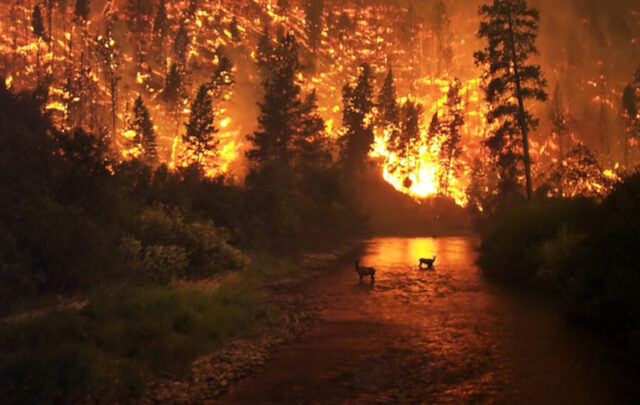So here we are. The price of a barrel of crude oil leapt to $52.02 on the New York Mercantile Exchange yesterday, having breached the $51 level only the day before, and today it briefly cracked $53 on its way to… well, who knows where? At just this moment, the Energy Department is predicting that consumers in the Northeast will be paying $1,223 for heating-oil this winter, a leap of 28% over last year.
Meanwhile in Iraq, the administration’s great oil adventure is aflame. According to Youssef Ibrahim, formerly of the New York Times and the Wall Street Journal, despite official administration dreams of drastically raising Iraq’s oil output and then using it to float our occupation, we’ve essentially “lost” Iraqi oil — as has the rest of the planet. “The reason oil prices have been hovering around $50 a barrel now,” he writes, “is that most of these Iraqi exports disappeared just as oil consumption began to skyrocket around the world.”
The Iraqis themselves, situated on one of the globe’s great oil reservoirs, are at present forced to import gasoline and other petroleum products from elsewhere over ever more dangerous supply lines. The sabotaging of the Iraqi oil infrastructure by insurgents is now widespread. According to Ibrahim, “At last count, the northern pipeline that carries oil to the Turkish Mediterranean port of Ceyhan has been blown up 37 times in 12 months.” Worse yet, neocon black-gold dreams of geopolitical domination, now translated into nightmarish reality, are fuelling oil vulnerability elsewhere, especially in Saudi Arabia. As the Washington Post‘s Justin Blum recently reported (Terrorists Have Oil Industry in Cross Hairs):
“Terrorists and insurgents are stepping up attacks on oil and gas operations overseas in an effort to disrupt jittery energy markets, destabilize governments and scare off foreign workers, analysts said. The attacks have been most intense in Iraq, but also have occurred in recent months in Indonesia, Pakistan, India, Russia and Nigeria.”
I don’t know whether this is good or bad news for jittery traders in oil futures, but it’s lousy news for the rest of us on this oil-soaked world. And here’s the strange thing, while the crucial oil arteries of the planet are beginning to clog, oil can hardly make it off the business pages of our papers; and though Iraq is now the central subject of debate in the presidential campaign and Senator Edwards has begun to whack at Halliburton — a giant energy services corporation after all — oil still seems a less-than-respectable subject for discussion (if you exclude meaningless pledges by both candidates to achieve oil “independence” for America). You explain it. Believe me, if Iraq’s main product had been video games, our press would have been flooded with front-page think pieces about the effects on the video-game industry and on our children. Pieces do appear from time to time, as John Cassidy’s Pump Dreams recently did in the New Yorker magazine, and there have been a spate of op-eds about “peak oil,” but generally speaking oil — the thing that fuels just about everything else — and the geopolitics of energy domination have been woefully under-covered in our media.





